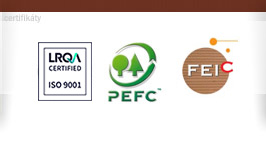| Term | Definition |
| Plywood | Wood-based panel consisting of an assembly of layers glued together with the direction of the grain in adjacent layers usually at right angles. |
| Balanced plywood | Plywood in which the layers are symmetrical about the central layer with respect to thickness, grain orientations and species. |
| Veneer plywood | Plywood in which all the layers are made of veneers oriented parallel to the plane of the panel. |
| Core plywood | Plywood having a core. |
| Blockboard | Core plywood, the core of which is made of strips of solid wood more than 7 mm wide but not wider than 30 mm, which may or may not be glued together. |
| Laminboard | Core plywood, the core of which is made of strips of rotary cut veneer, not thicker than 7 mm, placed on edge, all or most of which are glued together. |
| Composite plywood | Plywood, the core (or certain layers) of which is made of materials other then solid wood or veneers. There are at least two crossbanded layers on each side of the core. |
| Moulded plywood | Plywood which is not flat, made by pressing in a mould. |
| Long grain plywood | Plywood in which the grain of the outermost plies is parallel or nearly parallel to the long edge of the panel. |
| Cross grained plywood | Plywood in which the grain of the outermost plies is parallel or nearly parallel to the short edge of the panel. |
| Layer | Either one ply or two or more plies glued together with their grain direction parallel or another material. |
| Cross band | Inner layer with grain direction at right angles to the outermost plies. |
| Core | Central layer visible on the edges of the manufactured panel, generally thicker than the other layers and consisting of: - blocks or strips of wood placed side by side which are or are not be glued together; - other wood-based material; - other sheet material; - cellular construction. |
| Veneer | Thin sheet of wood not more than 7 mm in thickness. |
| Sliced veneer | Veneer produced by slicing. |
| Rotary cut veneer | Veneer produced by peeling. |
| Ply | Either one single veneer or two or more veneers joined edge to edge or end to end. |
| Surface | Visible part of outermost ply of a plywood. |
| Face | The better quality surface of a plywood. |
| Back | The opposite surface to the face. |
| Length of a panel | The panel dimension in the direction of the grain of the outermost layers. |
| Width of a panel | The panel dimension at right angle to the length. |
| Thickness of a panel | Dimension perpendicular to the surface of the panel. |
| Grain | General direction or arrangement of fibres. |
| Angle grain | Grain forming an oblique angle with the edges of a ply. |
| Spiral grain | Grain that follows a spiral course around the pith. |
| Interlocked grain | A characteristic of a wood where the fibres in succeeding growth periods incline alternately in opposite directions. |
| Veining | Network formed by veins of wood on the surface of veneer. |
| Curly grain | Grain that follows thight irregular curves. |
| Knot | Portion of a branch embedded in the wood. |
| Intergrown knot | Knot which is intergrown for at least 3 of its perimeter with the surrounding veneer. |
| Partially intergrown knot | Knot which is intergrown for 1 to 3 of its perimeter with the surrounding veneer. |
| Non adhering knot | Knot which is intergrown for less then 1 of its perimeter with the surrounding veneer. |
| Knot hole | Void produced by the removal of a knot. |
| Sound knot | Knot showing no indication of rot. |
| Pin knot | Sound intergrown knot of no more than 5 mm diameter. |
| Check | Separation of the fibres which does not extend through the thickness of the veneer. |
| Splint | Separation of the fibres which extend through the thickness of the veneer. |
| Stain | Any variation from the natural colour of wood, which is not associated with a loss of strength. |
| Resin pocket | Lens-shaped cavity in timber containing or that has contained resin. |
| Bark pocket | Bark that is partly or wholly enclosed in the wood. |
| Roughness | Unevenness of the surface due to irregularities of the structure of the wood or due to defective manufacturing. |
| Open joint | Discontinuity between two adjacent elements in a ply. |
| Overlap (joint) | Defect due to overlapping of two adjacent veneers (or two sections of a split veneer) in a ply. |
| Blister | Localised separation caused by area of glue bond failure between plies. |
| Bump | Local area of over-thickness showing in an outermost ply. |
| Hollow | Local depression in an outermost ply. |
| Imprint | Local indentation caused by foreign matter being pressed into a surface. |
| Inclusion | Foreign matter embedded in a veneer. |
| Plywood sanded only on one side | Plywood the face or back of which has been smoothed by means of a mechanical sander. |
| Plywood sanded on both sides | Plywood the face and back of which has been smoothed by means of a mechanical sander. |
| Scraped plywood | Plywood the face and/or back of which has been smoothed by means of a mechanical scraper. |
| Overlaid plywood | Plywood surfaced with one or several overlay sheets or one or several films such as: - impregnated paper; - plastic; - resin film; - metal; - decorative veneer. |
| Textured plywood | Plywood modified by mechanical method to create greater surface relief. |
| Veneered plywood | Plywood which is overlaid by a decorative wood veneer. |
| Sanding through | Local absence of the outer ply resulting from excessive sanding which reveals some of the glue line (and/or the underlying ply). |
| Glue penetration | Glue which has seeped through the outer ply and which can show up as blemishes. |
| Inserting | Repairing of a ply by an element of determinated shaped sound veneer, inserted to replace defective portions which have been previously removed. |
| Patch (or plug) | Piece of determined shaped veneer for inserting. |
| Shim | Piece of long and narrow shaped veneer for inserting. |
| Filling | Repairing by sealing of open defects with filler. |
| Bond | Adhesion by means of glue. |
| Lay-up | Arrangement of layers in a plywood. |
| Composition | Description of constituent elements of plywood. |
| Cup | Curvature of a panel across the width. |
| Bow | Curvature of a panel across the length. |
| Twist | Spiral distorsion of a panel |















